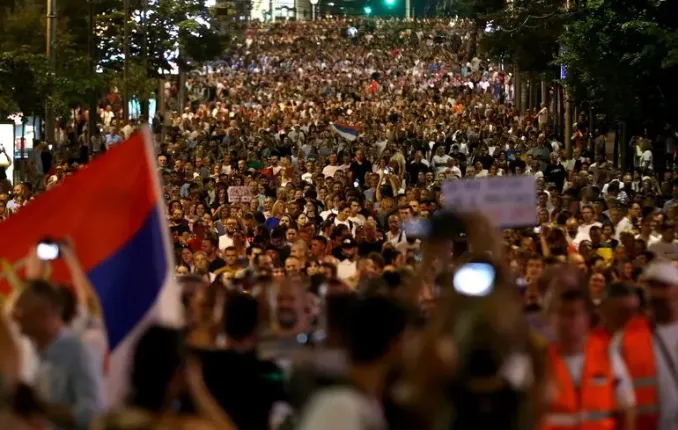Mass protests have erupted again in Serbia, marking the largest demonstrations in recent months

Students and numerous supporters of anti-corruption movements took to the streets of Belgrade, demanding immediate early parliamentary elections and the resignation of President Alexander Vučić, who has been in office for over 12 years. This widespread discontent has become a powerful response to the policies of the current government and concerns about the state of democracy, corruption, and freedom of speech in the country. According to Reuters, tens of thousands of people gathered on Saturday near government buildings, including around the parliament and the Pionirski Park neighborhood, where counter-protests by Vučić's supporters, brought in from different regions of the country, were also taking place. The protests in Serbia have been ongoing for several months and encompass various social groups — students, workers, teachers, and farmers. They began in late last year, notably following a high-profile tragedy in Novi Sad when a roof collapsed at a railway station on November 1, resulting in 16 deaths. The demonstrators see this tragedy as a consequence of widespread corruption and lack of oversight in the construction industry. In response to the protests, universities were repeatedly closed, further complicating society's situation and increasing dissatisfaction with the regime. The active protests have raised concerns among Vučić, who is accused by many of having an overly close relationship with organized crime, persecuting political opponents, and restricting media freedom. The president and his allies vehemently deny these allegations, asserting that democracy in the country remains intact. However, opponents emphasize that the government is trying to weaken the opposition and discredit the protesters by accusing them of preparing “foreign conspiracies.” During Saturday’s rallies, Vučić once again blamed “foreign states” for organizing the protests and called on the police to work with restraint, though his apparent intention was to firmly suppress any acts of radicalism. “The country will be protected, and bandits will face justice,” he told journalists in the capital. Meanwhile, law enforcement took precautionary measures, detaining about ten activists during previous protests, accusing them of subverting the constitutional order and terrorism. All detainees deny any involvement in crimes. Regardless of political assessments, protest sentiments in Serbia are growing in scale. The wave of protests began last December after the tragedy at the train station in Novi Sad, which has become a symbol of the country’s inertia and corruption. An increasing number of citizens — students, workers, educators, and rural residents — support the demonstrators. The new wave of protests coincides with an important Serbian holiday — St. Vitus Day, which commemorates the victory at the Battle of Kosovo in 1389 against the Ottoman Empire. This adds additional tension and symbolism to the negative wave sweeping Serbian society, which is combined with internal political crises. Besides internal issues, the country did not support the declaration adopted after the Fourth Ukraine-Southeast Europe Summit held on June 11 in Odesa. Serbian President Vučić, the only participant who refused to sign the document aimed at strengthening regional security and cooperation, focused instead on dividing efforts between cooperation with Russia and the European Union. Delegates agreed to support Ukraine, its post-war recovery, humanitarian aid, and energy cooperation, but Vučić’s position remained distant, causing some regional tension. The current situation indicates an increasingly complicated political and social climate in Serbia, where society is yearning for radical change while the government concentrates on suppressing protests and maintaining power. The international community is watching the situation with concern — as events in Serbia have the potential to impact not only the country’s internal stability but also the security of the entire region.

